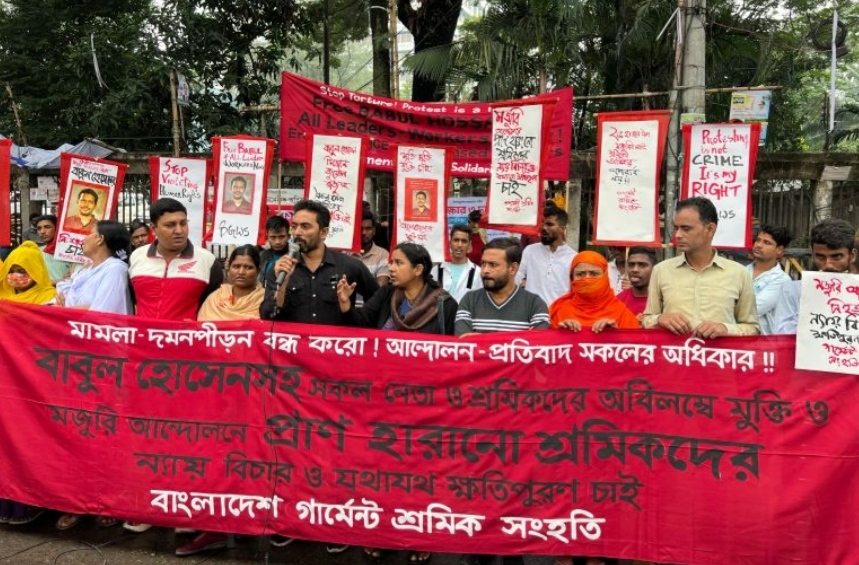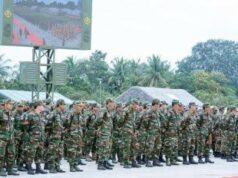Sanctions threat looms over Bangladesh’s garment sector : India must thwart all such destabilization attempts of EU & USA
Garment manufacturers worry a one-sided national vote could lead to economic sanctions for the nation and them.

Garment workers say the recent wage hike was not enough and there is still anger in the sector
Weeks after turbulent wage-hike protests and subsequent factory closures, Bangladesh’s ready-made garment (RMG) industry, a key revenue earner for the nation, is dealing with a new phase of anxiety: “possible” economic sanctions by the country’s Western partners.
The United States and European Union collectively account for more than 80 percent of Bangladesh’s multibillion-dollar apparel sales, and any sanction on the RMG industry would put a severe dent in its already beleaguered economy, said analysts.
The above just cannot be permitted India and Must be thwarted at all cost. NO INTERFERENCE should be read out like the Riot Act to these nations.
The threat of sanctions from the US arose once Dhaka announced January 7 for national elections in what is likely to be another seemingly one-sided vote.
Those concerns were further boosted in early December when a key garment supplier to the US was warned of sanctions in a letter of credit (LC) from a foreign garment buyer.
An LC is issued by financial institutions or similar parties to guarantee payment to sellers of goods and services after appropriate documentations are presented. It essentially helps in avoiding risk by having intermediate buyer and seller banks that ensure proper payment.
According to the LC, a copy of which was obtained by Al Jazeera, the Western buyer stated: “We will not process transactions involving any country, region or party sanctioned by the UN, US, EU, UK. We are not liable for any delay, non-performance or/ disclosure of information for sanction-based causes.”
Should the clause kick in, the garment manufacturer in Bangladesh would likely incur massive losses as the buyer wouldn’t be liable to make any payment for the orders placed with that apparel producer.
Both industry leaders and government officials have dismissed the threat as a “rumour” and “anti-government” propaganda and say no such economic sanction can be imposed, especially on the garment sector, as it is a fully compliant industry and abides by all the international labour laws.
Faruqe Hassan, President of Bangladesh Garments Manufacturers and Exporters Association (BGMEA) said that the LC came from a particular buyer, and was not a statutory order or notice by “any specific country or countries”.
“From BGMEA, we have already contacted the buyer and the issue was sorted out. It was just a cautionary clause inserted by the bank who prepared the LC on behalf of the buyers,” Hassan told Al Jazeera, “It doesn’t mean that any country is planning to impose some sanctions on our industry.”
BGMEA President Faruque Hassan said manufacturers are concerned about the potential of economic sanctions
Hassan however admitted that many factory owners had expressed their concerns in a recent BGMEA meeting over that LC clause and the “ongoing political turmoil of Bangladesh has given birth to all sorts of speculations”.
Bangladesh’s national election is due in less than three weeks but several political unrests have disrupted the country’s business and economy.
Bangladesh Nationalist Party (BNP), the main opposition party, has boycotted the election amidst concerns of severe poll rigging. That sets up the elections as a repeat of one-sided polls held in 2014, in which Sheikh Hasina-led Awami League won 153 out of 300 parliamentary seats uncontested.
BNP says no free and fair election is possible under a partisan government and gave an example of the 2018 poll, in which it took part. Independent observers termed it a severely “rigged” election which saw Awami League securing 288 out of 300 seats, a result that The Washington Post said could only be expected in a country like North Korea.
For the last few months, opposition parties have been staging protests on the streets to press home the demand of installing a neutral election-time caretaker government.
The government has, since late October, used brute force and court cases to suppress the protests. In November alone, more than 10,000 BNP leaders and activists were thrown in jail. None have received bail so far.
Khondokar Golam Moazzem, research director of Bangladeshi think tank Center for Policy Dialogue (CPD) told Al Jazeera that the current political upheaval has obviously played its role in propagating the widespread notion that Bangladesh’s RMG industry might face an economic sanction.
The United States has already taken a tough stance with a new visa policy for Bangladesh in September in which it said it would impose a visa sanction on “individuals undermining the democratic election process in Bangladesh”.
The warning note in the LC also came at a time of severe unrest in the RMG sector over minimum wage hikes in which four workers died.
Bangladesh has witnessed severe unrest over wage issues for garment workers
It also coincided with the introduction by the US, Bangladesh’s single largest garment buyer, of the Presidential Memorandum on Advancing Worker Empowerment, Rights, and High Labor Standards Globally.
The memorandum is the Biden administration’s effort “to pursue a whole-of-government approach to advancing worker empowerment and organizing, workers’ rights, and labor standards globally”.
While introducing the bill, the US Secretary of State specifically mentioned a firebrand garment labour activist in Bangladesh and said: “We want to be there for people like Kalpona Akter, a Bangladeshi garment worker and activist, who says that she is alive today because the US embassy advocated on her behalf.”
After the new US bill, the Ministry of Commerce in Bangladesh received a letter from the Bangladesh embassy in Washington, DC in which the embassy speculated that “Bangladesh could be among the countries targeted by the new US Memorandum”.
Al Jazeera has seen the letter and Commerce Secretary Tapan Kanti Ghosh acknowledged its receipt and told Al Jazeera that the Bangladesh government had already informed the US about the recent steps they had taken to protect labour rights in Bangladesh. “We are very serious about labour rights and we are the signatory of all the ILO conventions.”
Germany-based Bangladeshi financial analyst Zia Hassan told Al Jazeera that the prospect of US sanctions on Bangladesh’s garment industry cannot be ruled out.
“Historical patterns indicate wide visa sanctions are likely in retaliation for suspected election manipulation – a typical American response to alleged voting fraud globally,” he said adding that while the US doesn’t typically impose economic sanctions on grounds of a country’s politics alone, the possible garment trade sanction could hinge on issues of workers’ rights.
“Denial of a fair bargain in wages negotiations, labour violations through threats, imprisonment or even murder of vocal labour advocates may see the US act on its warnings to sanction labour abuse,” he said.
Labour rights activist Akter told Al Jazeera that even though the workers were back at work after the revision of the minimum wage hike, their demands had not been met and the anger over injustice to the workers is still bubbling in the sector.
“Hundreds of our workers were thrown in jail for taking part in the protests and they are not given bail as of now. The hike that was given is not at all sufficient to fight the rising inflations. So the industry’s claim that the workers’ rights are protected is not true,” she said.
“However, we obviously don’t want any sanction on this industry. It will be devastating not only for our workers but also for our economy,” she added.
Source : AL JAZEERA



